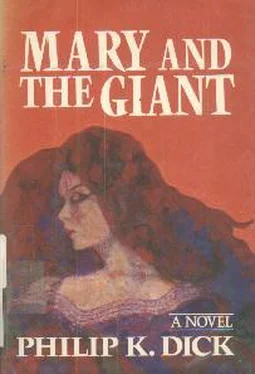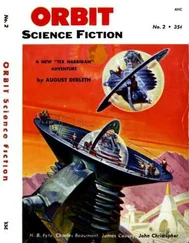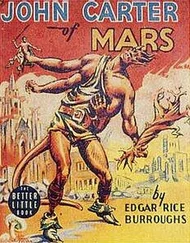Philip Dick - Mary And The Giant
Здесь есть возможность читать онлайн «Philip Dick - Mary And The Giant» весь текст электронной книги совершенно бесплатно (целиком полную версию без сокращений). В некоторых случаях можно слушать аудио, скачать через торрент в формате fb2 и присутствует краткое содержание. Жанр: Фантастика и фэнтези, на английском языке. Описание произведения, (предисловие) а так же отзывы посетителей доступны на портале библиотеки ЛибКат.
- Название:Mary And The Giant
- Автор:
- Жанр:
- Год:неизвестен
- ISBN:нет данных
- Рейтинг книги:4 / 5. Голосов: 1
-
Избранное:Добавить в избранное
- Отзывы:
-
Ваша оценка:
- 80
- 1
- 2
- 3
- 4
- 5
Mary And The Giant: краткое содержание, описание и аннотация
Предлагаем к чтению аннотацию, описание, краткое содержание или предисловие (зависит от того, что написал сам автор книги «Mary And The Giant»). Если вы не нашли необходимую информацию о книге — напишите в комментариях, мы постараемся отыскать её.
Mary And The Giant — читать онлайн бесплатно полную книгу (весь текст) целиком
Ниже представлен текст книги, разбитый по страницам. Система сохранения места последней прочитанной страницы, позволяет с удобством читать онлайн бесплатно книгу «Mary And The Giant», без необходимости каждый раз заново искать на чём Вы остановились. Поставьте закладку, и сможете в любой момент перейти на страницу, на которой закончили чтение.
Интервал:
Закладка:
"We could go anywhere," she declared.
"That's so."
"How far do you suppose we could walk? Would we still be walking when the sun came up?"
"Well," Schilling said, "probably not." It was eleven-fifteen. "We'd have to walk for seven hours."
"Where would we be then?"
He calculated. "We might make it to Los Gatos, if we kept on the main highway."
"Have you ever been in Los Gatos?"
"Once. That was back in 1949, when I was still working for Allison and Hirsch. I had a vacation, and we were on our way to Santa Cruz."
Mary Anne asked: "Who is 'we'? "
"Max and myself."
Walking slowly across the street she said: "How close were you and Beth?"
"At one time we were very close."
"As close as you and I?"
"Not as close as you and I." He wanted to be honest with her, so he said: "We spent a night together at a cabin up along the Potomac, in a little old lock-keeper's cabin on the old canal. The next morning I brought her back to town."
"That was when Danny Coombs tried to kill you, wasn't it?"
"Yes," he admitted.
"You weren't telling me the truth before." But there was no rancor in her voice. "You said you hadn't been with her."
"Beth-wasn't his wife then." This time he couldn't tell her the truth, because he couldn't expect her to understand. The situation had to be experienced.
"Did you love her?"
"No, absolutely not. It was a mistake on my part-I always regretted it."
"But you love me."
"Yes," he said. And he meant it very much.
Satisfied, the girl strolled on. But after a time she seemed to fall back into worry. "Joseph," she said, "why did you go with her if you didn't love her? Is that right?"
"No, I suppose not. But with her it was a regular event ... I wasn't the first, nor the last." So he had to explain anyhow. "She was-well, available. Physical acts of that sort happen. Tensions build up. .. they have to be expiated in some fashion. No personal element is involved."
"Did you ever love anybody before me?"
"There was a woman named Irma Fleming who I loved a great deal." He was silent for a moment, thinking back to his wife, whom he hadn't seen in years. He and Irma had legally separated in-good God-1936. The year Alf Landon ran for president. "But," he said, "that was a long time ago." It certainly was.
"How long ago?" Mary Anne asked.
"I'd rather not say." There were a lot of things, related things, he would rather he didn't have to say.
"If I asked, would you tell me your age?"
"I'm fifty-eight years old, Mary."
"Oh." She nodded. "That's about what I thought."
They had reached the car wash at the edge of the main highway. Seeing it, Schilling recalled the first hour he had spent in Pacific Park: the Negro named Bill who had owned the car wash, and his assistant who had been somewhere getting a Coke. And the dark-haired high school girl.
"Did you go to this high school?" he asked.
"Sure. It's the only one around."
"When was that?" He could, easily, picture her as a high school girl; he could imagine her in sweater and skirt, carrying a few textbooks, roaming, as the dark-haired girl had roamed, from the high school to Foster's Freeze at three o'clock in the warm midsummer afternoon.
Fresh little breasts, he thought almost sadly. Like cakes of yeast. The lightly downy body, growing and budding ... and, from it, the smell of spring.
"That was a couple of years ago," Mary Anne said. "I hated school. All the dumb kids."
"You were a kid, too."
"But I wasn't dumb," she said, and he could well believe it.
Beyond the closed-up car wash was a small roadside ceramics shop. A few lights were still on; a woman in a long smock was carrying pottery into the building.
"Buy me something," Mary Anne said suddenly. "Buy me a cup or a flowerpot-something I can have."
Schilling approached the woman. "Is it too late?" he asked.
"No," the woman said, continuing. "You can have anything you see. But excuse me if I don't stop."
Together, he and Mary Anne walked among the bowls and vases and plates and jars and wall planters. "Do you see anything you want?" he asked. Most of it was the usual garish oddities sold to motorists.
"You pick it out," Mary Anne urged.
He looked and found a simple clay dish glazed a light speckled blue. Paying the woman, he carried it to Mary Anne; she stood waiting at the edge of the field.
"Thank you," she said shyly, accepting the dish. "It's nice."
"It isn't ornate, at least."
Carrying her dish, Mary Anne wandered on. Now they had left the stores behind; they were approaching a dark square of trees at the edge of town. "What's that?" Schilling asked.
"A park. People come and eat picnics here." The entrance was barred by a hanging chain, but she stepped over it and continued on toward the first table. "Nobody's supposed to be in here at night, but they never bother to check. We used to come here all the time ... us kids from school. We used to drive up here at night and park and leave the car and go on inside on foot."
Beyond the table was a stone barbecue pit, a trash can, and, after that, a drinking fountain. A tangle of trees and shrubs grew around the picnic area, a chaotic blur of night.
Sitting down on the bench beside the table, Mary Anne leaned back and waited for him to catch up. The dirt slope was an upgrade, and he found himself short of breath by the time he had reached her. "It's pleasant here," he said, lowering himself to the bench beside her. "But the other one has the duck."
"Oh, yes," she said. "That big drake. He's been there for years. But I can remember when he was a baby."
"You like him?"
"Sure, but he tried to bite me once. Anyhow, that park's for the pensioners." She looked around her. "In summer we used to sit here, when it was nice and hot, drinking beer and listening to a Zenith portable we carried around. I forget who it belonged to. It fell out of the car one day and got smashed."
Holding her blue dish on her lap, she carefully examined it.
"At night," she said, "you aren't able to tell what color it is."
"It's blue," Schilling said.
"Is it painted?"
"No," he explained, "it's a fire-baked glaze. It's put on with a brush and the whole affair is stuck in a kiln."
"You know almost everything there is."
"Well, I've seen pottery fired, if that's what you mean."
"Have you been all over the world?"
He laughed at the thought. "No, only to Europe. England, France, a year or so in Germany. Not even all of Europe."
"Can you speak German?"
"Fairly well."
"French?"
"Not so well."
"I took two years of Spanish in high school," Mary Anne said. "Now I can't remember any of it."
"You'd get it back if you ever needed it."
"I'd like to travel," she said. "I'd like to visit South America and Europe and the Orient. What do you suppose it's like in Japan? My roommate has a brother who was in Japan after the war. He sent her a lot of ashtrays and trick boxes and lovely silk curtains and a silver letter opener."
"Japan would be nice," Schilling said. "Let's go there, then."
"All right," he agreed, "we'll go there first."
For a period Mary Anne was silent. "Do you realize," she
said finally, "that if I dropped this dish it, would smash to smithereens?"
"It probably would."
"What then!"
"Then," Schilling said, "I'd get you another."
Abruptly, Mary Anne hopped down from the bench. "Let's walk. Will we get hit and killed if we walk along the highway?"
"It's possible."
She said: "I want to, anyhow."
It was eleven-forty-five. They walked two hours, neither of them saying much, concentrating instead on the cars that rushed past them every now and then, stepping off the highway, standing on the weedy ground, and then starting back again when each car was gone.
Читать дальшеИнтервал:
Закладка:
Похожие книги на «Mary And The Giant»
Представляем Вашему вниманию похожие книги на «Mary And The Giant» списком для выбора. Мы отобрали схожую по названию и смыслу литературу в надежде предоставить читателям больше вариантов отыскать новые, интересные, ещё непрочитанные произведения.
Обсуждение, отзывы о книге «Mary And The Giant» и просто собственные мнения читателей. Оставьте ваши комментарии, напишите, что Вы думаете о произведении, его смысле или главных героях. Укажите что конкретно понравилось, а что нет, и почему Вы так считаете.










